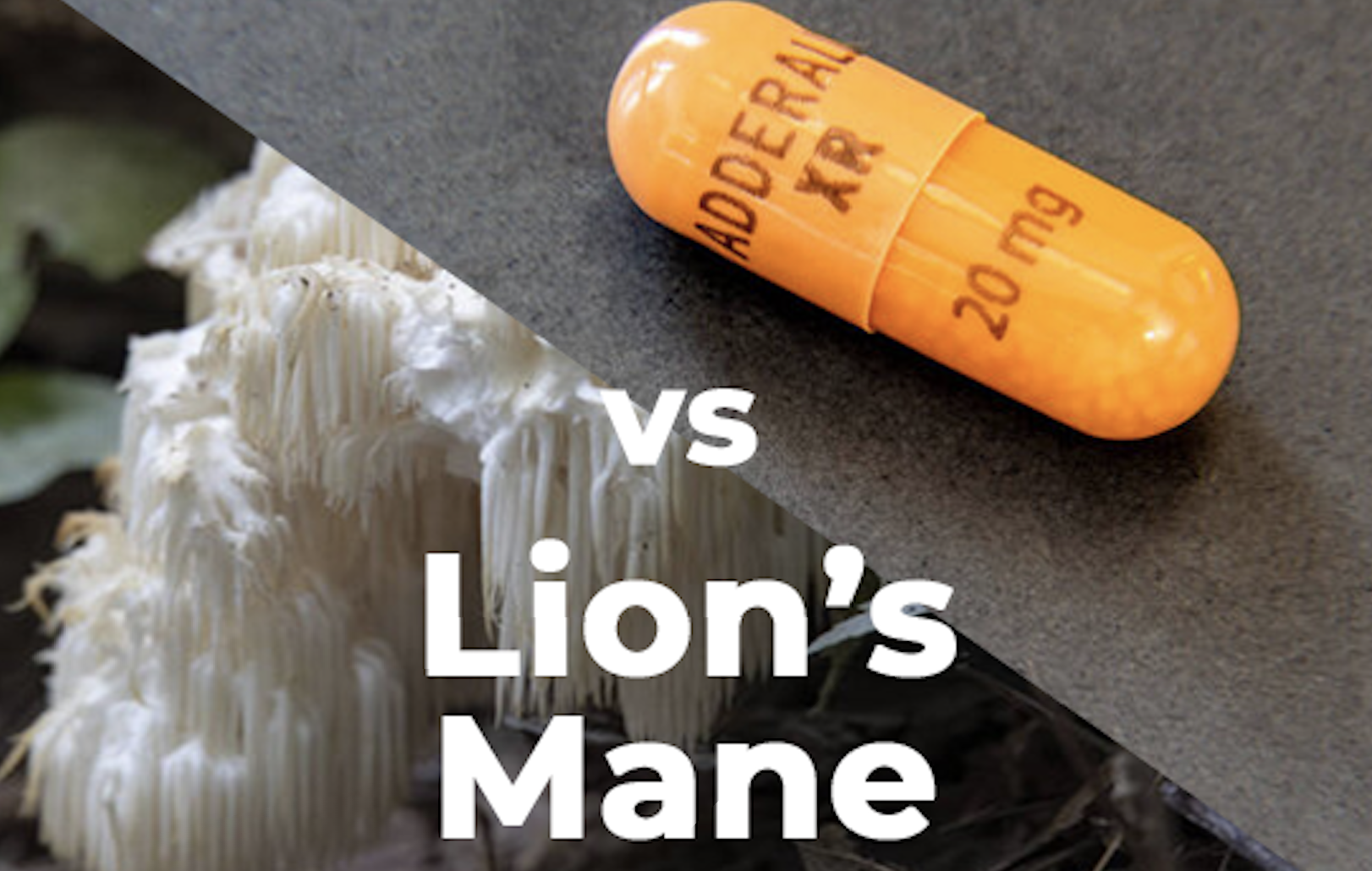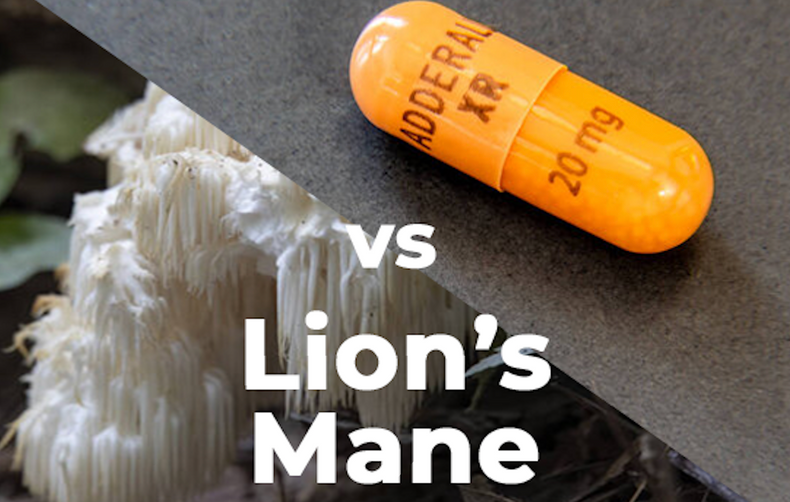The oldest superfood, Lion's Mane mushrooms, provides incredible brain-boosting benefits and appear to alleviate symptoms of ADHD. But can they really be as effective as Adderall? Well…yes and no. Let’s take a closer look.

What is Lion’s Mane?,
Lion’s mane (Hericium erinaceus) is a shaggy-looking that grows in Europe, Asia, and North America. It’s known as one of the healthiest fungi you can consume thanks to the many benefits it provides, so it’s no wonder Lion’s Mane has remained a staple in alternative medicine for centuries.
What are the Health Benefits of Lion’s Mane?
Research on the potential benefits of Lion's Mane indicates this fungus has the potential to promote nerve regeneration through the production of nerve growth factor proteins, and hence repair brain cells. It appears to ease the symptoms of dementia, lessen oxidative stress, as well as improve cognitive functions and neuronal health. Some of the beneficial effects of lion’s mane include:
- reduces symptoms of anxiety and depressive disorders
- reduces inflammation and oxidation
- improves memory and overall brain health and cognitive functioning
- reduces the risk of heart disease and blood clots
- promotes neurite outgrowth
- enhances focus, improves mental clarity, and protects against mild cognitive impairment and Alzheimer’s disease
- lowers blood sugar levels and aides in diabetes treatment
- encourages apoptosis(cell death) of cancer cells, and has the potential to fight cancer
- improves digestive health and prevents stomach ulcers
- boosts the immune system and improves immune function
- has neuroprotective properties and reduces nerve damage in neurodegenerative autoimmune disorders

What are the Side Effects of Lion’s Mane?
Although there is no research on the side effects of Lion's Mane, centuries of use suggest that this mushroom is completely safe to consume for healthy individuals. However, you should be cautious of taking medicinal mushrooms, including Hericium erinaceus, if you are on blood thinners.Since this mushroom prevents blood clotting, Lions Mane could interact with the medication that has the same effect (such as Aspirin, Heparin, and Warfarin) and slow down coagulation and wound healing. Thus, it’s best to consult a healthcare professional before you start taking lion’s mane if you take anticoagulants.
What is ADHD?
ADHD (attention deficit hyperactivity disorder) is a medical condition that affects attention and self-control. These days, the condition is usually diagnosed in childhood, although many folks who grew up in decades past learn about their condition as adults.The cause of ADHD is unknown, but genetics and environmental factors are known contributors. Additionally, alcohol and tobacco use during pregnancy could influence a predisposition toward ADHD.There may be differences in brain chemistry in people with ADHD compared to those who don’t have the disorder.
Traditional ADHD Treatment Options
Traditional ADHD treatment usually consists of medication and psychotherapy. The most common medication is an amphetamine called Adderall. When it comes to psychotherapy, cognitive-behavioral therapy (CBT) is the most common modality used to treat the condition.
What Supplements Can Interfere with Adderall?
Supplements that contain vitamin C (ascorbic acid) can interfere with Adderall. Vitamin C is acidic, while the Adderall active ingredients are alkaline and don’t interact well with acids. Therefore, vitamin C can slow down the absorption of Adderall.Since many foods can contain ascorbic acid, you should err on the side of caution and take Adderall on an empty stomach about an hour before you eat breakfast.
Natural Alternatives to Adderall
Nootropic brain supplements (also known as ‘smart drugs’) are the most widely used natural Adderall alternatives. These brain booster supplements often contain B vitamins (especially vitamin B6 and vitamin B12), ginkgo biloba, citicoline, alpha GPC, and other adaptogenic compounds that improve brain function.Herbal supplements (such as Rhodiola rosea and maritime pine bark extract) can also act as brain boosters, although there is a lack of research on their interaction with Adderall.Nowadays, more and more people with ADHD are turning to fungi to manage and treat ADHD, and the lion’s mane medicinal mushroom shows the most promise, thanks to its brain-boosting properties.
Does the Lion's Mane Mushroom Help with ADHD?
Although there is no research on the effects of lion’s mane extract on ADHD, anecdotal evidence suggests that it could be quite beneficial when used with traditional treatment methods. Many people with ADHD use the medicinal mushroom as a natural remedy due to its ability to improve focus and alleviate symptoms of mental health disorders that often accompany ADHD. Lion’s mane shows great potential when it comes to boosting concentration and improving cognitive function. It’s shown to improve cognitive performance, with its effects on focus and memory being particularly beneficial. It’s also been demonstrated to alleviate symptoms of anxiety and depression. In short, Lion's Mane helps with many of the symptons of ADHD, even if the research is lacking on its effects on ADHD itself.
Lion’s Mane vs. Adderall: What’s a Better Treatment Option for ADHD?
Lion’s mane and Adderall don’t have the same effect on the brain. Adderall stimulates the central nervous system (much like coffee does), which boosts brain activity in people with ADHD.Unfortunately, Adderall comes with side effects, such as headaches, nervousness, insomnia, loss of appetite, and more. Many people with ADHD can’t take Adderall due to the severity of their side effects or may be hesitant to try the medication.
Lion’s mane mushrooms can be brain boosters as well, their effect on the brain’s activity is much milder, and they don’t have any major side effects. Nowadays, many people with ADHD opt for natural supplements and forgo Adderall altogether, while others combine the medication with a nootropic brain booster, such as lion’s mane.
In short, Adderall is simply a stimulant that activates the brain differently, while Lion's Mane provides many, if not all, the same benefits without the "stimulated feeling".
How Much Lion’s Mane Should You Take for ADHD?
Anecdotal evidence suggests that you should take a higher dosage of lion’s mane for it to alleviate symptoms of your ADHD. Lion's Mane dosages for ADHD usually range from 2000 mg to 5000 mg per day, but it’s best to start with 2000 mg and work your way up over time.If you’re new to this nootropic brain booster, starting with 1000 mg may cause digestive issues. To avoid this side effect, take Lion’s Mane with food (or eat foods fortified with lion’s mane).\
Lion’s Mane vs. Adderall FAQ
Does ginkgo biloba help with ADHD?
Yes, ginkgo biloba appears to help with ADHD. This nootropic supplement was shown to be an effective complementary treatment for ADHD in a 2015 study. Ginkgo biloba reduced symptoms of ADHD in children and adolescents after five weeks of use.
Does lion's mane give you energy?
Yes, lion’s mane can give you an energy boost. This mushroom does not contain caffeine, so it won’t give you as much energy as coffee or tea do, but it can act as a natural energy booster. Plus, since it has no caffeine, lion’s mane won’t cause jitters or a midday energy crash.
How quickly does lion's mane work?
That depends on what you’re taking the mushroom for. You can notice the short term effects of Lions Mane after just a few days. You’ll likely feel less anxious and more energized within the first two weeks of taking a lion’s mane mushroom extract. However, to reap the long-term benefits of lion’s mane, such as its antioxidant activities, you should be taking it consistently for at least a few months.
How does lion’s mane compare to Cognizin citicoline?
Citicoline, better known by its patented name Cognizin, is a biochemical with brain-boosting properties. This chemical has similar evidence-based effects on the brain as lion’s mane, as they both improve memory and focus, which is beneficial whether you have ADHD or not. Although the benefits of citicoline and lion’s mane on the brain are analogous, the mechanisms with which they operate are different, which is why it can be advantageous to take both nootropics for the benefits they provide for the brain.



